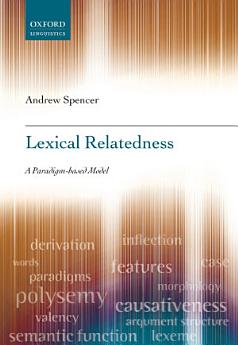Lexical Relatedness
oct 2013 · OUP Oxford
Libro electrónico
480
Páginas
family_home
Apto
info
reportLas calificaciones y opiniones no están verificadas. Más información
Acerca de este libro electrónico
This book argues (a) that there is no principled way to distinguish inflection and derivation and (b) that this fatally undermines conventional approaches to morphology. Conceptual shortcomings in the relation between derivational and lexically-derived word forms, Andrew Spencer suggests, call into question the foundation of the inferential-derivational approach. Prototypical instances of inflection and derivation are separated by a host of intermediate types of lexical relatedness, some discussed in the literature, others ignored. Far from finding these an embarrassment Professor Spencer deploys the wealth of types of relatedness in a variety of languages (including Slavic, Uralic, Australian, Germanic, and Romance) to develop an enriched and morphologically-informed model of the lexical entry. He then uses this to build the foundations for a model of lexical relatedness that is consistent with paradigm-based models. Lexical Relatedness is a profound and stimulating book. It will interest all morphologists, lexicographers, and theoretical linguists more generally.
Acerca del autor
Andrew Spencer is Professor of Linguistics at the University of Essex. His publications include The Handbook of Morphology, (1998, co-edited with Arnold Zwicky), Phonology: Description and Analysis (1996), and Morphological Theory (1991), all published by Wiley-Blackwell. He is also the co-author of Clitics: An Introduction (2012), with Ana Luís, published by Cambridge University Press.
Califica este libro electrónico
Cuéntanos lo que piensas.
Información de lectura
Smartphones y tablets
Instala la app de Google Play Libros para Android y iPad/iPhone. Como se sincroniza de manera automática con tu cuenta, te permite leer en línea o sin conexión en cualquier lugar.
Laptops y computadoras
Para escuchar audiolibros adquiridos en Google Play, usa el navegador web de tu computadora.
Lectores electrónicos y otros dispositivos
Para leer en dispositivos de tinta electrónica, como los lectores de libros electrónicos Kobo, deberás descargar un archivo y transferirlo a tu dispositivo. Sigue las instrucciones detalladas que aparecen en el Centro de ayuda para transferir los archivos a lectores de libros electrónicos compatibles.




